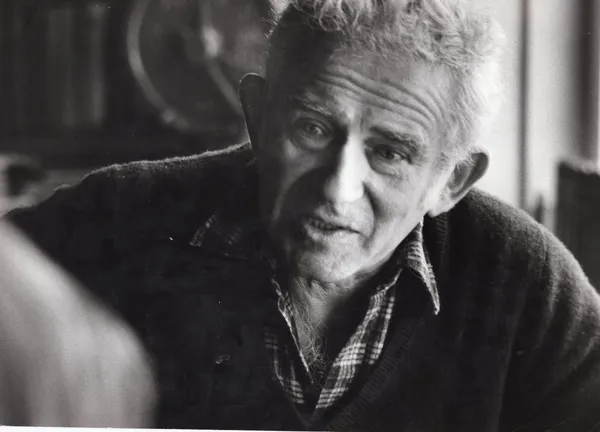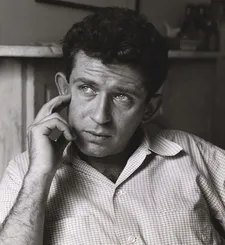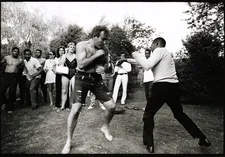In the first instalment with Jeff Zimbalist on How To Come Alive With Norman Mailer (co-written with Victoria Marquette and a highlight of the 14th edition of DOC NYC) we start out by discussing how Jeff became an executive producer of Frédéric Tcheng and Bethann Hardison’s Invisible Beauty (a highlight in the 21st edition of the Tribeca Film Festival) after his film Favela Rising’s premiere at Tribeca in 2005.
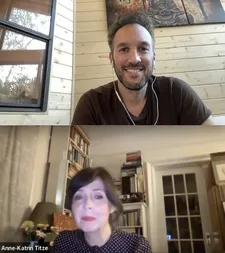 |
| Jeff Zimbalist with Anne-Katrin Titze on the Norman Mailer/Matthew Barney connection: “River of Fundament is incredible. Some of the work he did with Mailer, Houdini, is phenomenal stuff. ” |
The Norman Mailer/Matthew Barney film connection (River Of Fundament and Houdini); Maidstone and Rip Torn; the interviews with Gay Talese and Mailer’s sister Barbara Wasserman; John Buffalo Mailer (executive producer) and Susan Mailer’s involvement in getting the project started, and more came up.
Oliver Stone’s response to the question in the title is to “engage with your fear,” while John Waters calls some of Mailer’s filmic output “Reality TV before Reality TV.” There are clips from the infamous 1971 Town Hall event (A Dialogue on Women’s Liberation with Germaine Greer, Betty Friedan, Susan Sontag, Jill Johnston, Diana Trilling, Cynthia Ozick, Elizabeth Hardwick, and Jacqueline Ceballos) where Mailer was taught a lesson or two.
The film is full of verbal nuggets, such as Gloria Steinem’s reflection that Mailer was “the only one who tries all the American Dreams.” The incredible story of his Maidstone movie is worth resurrecting again here and seeing his alter-ego auditioning women, will make present-day audiences’ skin crawl. All his wives and children and mistresses are assembled, until Rip Torn enters with a hammer.
The books, the numerous TV appearances when the talk was of a higher calibre than today, commentary by the children and snapshots of all their stepmoms and moms, bad life decisions and good ones - How To Come Alive With Norman Mailer (a cautionary tale) fittingly ends with him on the Cyclone roller coaster in Coney Island, Brooklyn, that stops in mid-motion. In an interview with Charlie Rose in 2003, Mailer at 80 saw America “become less noble, less exciting as a country, more loutish, more corporate driven.” Besides so many other things, he has turned out to be a prophet.
“No one ever said writers have to be nice.” He was called “the bad boy of American letters.” Six wives, nine children. A gigantic literary career, a gigantic ego. Jeff Zimbalist’s incisive film approaches Norman Mailer from all sides and comes up with seven chapters, each exploring a piece of Mailer advice. These range from “Act stronger than you feel and you will soon feel as strong as you act” to “Grow or else pay more for remaining the same.”
From Los Angeles, Jeff Zimbalist joined me on Zoom for an in-depth conversation on How To Come Alive with Norman Mailer and executive producing Invisible Beauty.
Anne-Katrin Titze: Hello, Jeff!
Jeff Zimbalist: Hi! You did an article on Invisible Beauty! Who did you interview? Bethann [Hardison]?
AKT: No, Fred [Frédéric Tcheng]. I had interviewed him for three of his past films also. How did you get involved in that film?
JZ: It was funny, because my first film played at Tribeca in 2005, Favela Rising. And Bethann liked it; I had never met her. She came up to me afterwards, waited in the long line, and then said: "I want you to make the story of my life, this is who I am." I vaguely remembered it, because it was a frenetic moment.
And then she followed up and we developed relationships. I’d worked on that film since 2006, probably, all the way through the release. The longest I’ve ever worked on a movie and I’m thrilled that it did so well and Bethann’s legacy is being celebrated, but also that the film is contributing to the dialogue. She just doesn’t give up. So thank you for giving it more publicity! That’s great.
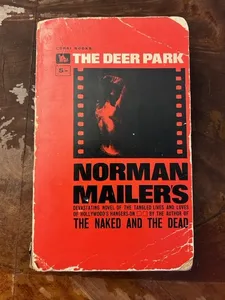 |
| The Deer Park by Norman Mailer, collection Ed Bahlman Photo: Anne-Katrin Titze |
AKT: It’s an important and beautiful film. Frédéric Boyer of Tribeca was the first to point the film out to me.
JZ: Oh cool.
AKT: Let’s talk about Norman Mailer - How to come alive with Norman Mailer. Is it a self-help film or is it a cautionary tale? That’s the question throughout.
JZ: You saw it, right?
AKT: Yes, of course, I saw it.
JZ: I think that’s the balancing act. We went into the project knowing it was going to be, I think, both its greatest challenge and its greatest opportunity. Because Norman Mailer, if nothing else, is polarizing. Because he has some of the most impressive, inspiring analyses and observations of the human condition, which is deeply important, in my opinion.
And on the other hand, he’s completely alienating, because of some of the ways in which his ego really got out of hand and has been talked about frequently as a hyper-misogynistic, homophobic addict to violence, who has done criminal things, has done immoral things. So how to contain such extremes in the same hour and 40 minutes was an exciting challenge for us.
I’m glad that that’s how you phrased your first question. Because if the film’s effective, I believe it is creating that tug-of-war, of hopefully getting the viewer to understand, sympathize with, maybe even root for some of the ideas and philosophies and worldviews that Mailer has. At the same time, that you never want to let yourself celebrate Norman Mailer. Given the place that we’re at societally, it’s important to have people like Norman Mailer who are willing to be hated, allowing themselves to not care about the response.
 |
| John Buffalo Mailer is an executive producer of How To Come Alive With Norman Mailer Photo: Anne-Katrin Titze |
AKT: Alive he surely was! That’s the word.
JZ: That’s the other part of it, right, that’s the title. And using these chapter headers, these kind of lessons of Mailer.
AKT: Which are great!
JZ: I appreciate that.
AKT: All seven make sense, and that’s not an easy task. How did you come up with this structuring idea?
JZ: We knew from the beginning that we didn’t want to make it like a comprehensive survey of all of his works and parse out the good and the bad of all of his writings. Rather to bring his multi-layered, multi-dimensional character to life. So much of the talk of Norman Mailer is hyper-critical.
He’s essentially cancelled as an author in the canon, at least in the United States. People don’t read him alongside many of his peers. I felt like that was overshadowing the impact that Norman Mailer’s work had on me personally, which was much more optimistic and uplifting.
To me growing up as a young artist-in-training, raised by intellectuals, also Jewish, Norman Mailer and his work represented artistic courage, that bold willingness to fight for unpopular ideas, no matter the outcome. And that if you really want to get to the root of the human psyche or the human condition or the politics of the time, or whatever it is you’re investigating and wanting to observe and analyse and transform, you have to lock yourself in a box that doesn’t care what the outside thinks of your ideas.
Then you have to go and proudly use your ideas to provoke. That’s how you elevate consciousness. To me that was brilliant and inspiring. So I felt there was a way to approach a portrait of Mailer that (this is a cautionary tale) also is offering you some of the insights that are most vital today. That was what we did with the titles. I’m curious to hear how audiences respond to that balancing act.
AKT: You begin with the stabbing, these are the first images we see. And you end in the middle of a roller-coaster ride, which I think is very fitting. And near the end also you feature my dear friend Gay Talese, calling Mailer “deliciously reckless, romantically reckless.” It’s beautiful.
JZ: He’s going to join me for the Q&A at DOC NYC.
AKT: He told me!
JZ: He’s amazing, he came in with a top hat and the bright suit. We had the perfect setting for him.
AKT: Where did you film him?
JZ: I forgot the name of the restaurant; it was Upper East Side. We did two interviews that day. Often when you’re doing an interview, you don’t instruct the subject as to what to wear. We don’t have a wardrobe department. Sometimes it just clicks. They walk in and it fits perfectly, it’s just meant-to-be.
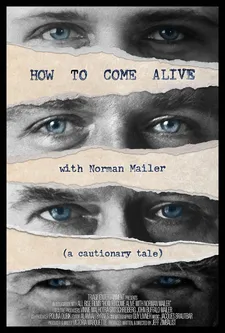 |
| How To Come Alive With Norman Mailer (a cautionary tale) poster |
But yeah, it’s the roller-coaster life of a man and the symbolism of ending on a roller coaster and encouraging our viewers to choose the more risky, higher-risk, higher-reward path with their lives as a way to come alive.
AKT: You have interviews with John Waters, with Oliver Stone. Did you also reach out to Matthew Barney?
JZ: Yes, we interviewed Matthew Barney as well. There’s a number of interviews that didn’t make the cut. There was far too many incredibly eloquent speakers to fit everybody in. Every interview, including Matthew’s, was really really helpful in shaping the picture of Mailer. We did end up focusing a lot less on Mailer’s film career, Mailer, the filmmaker.
Ultimately his life got so many chapters that it was too much to fit in. But yeah, we did interview Matthew and he was great. I mean, River of Fundament is incredible. Some of the work he did with Mailer, Houdini, is phenomenal stuff.
AKT: I had a conversation with Buffalo [Mailer] about that and how he went inside the animal carcass during the filming of the Matthew Barney movie. Was it Buffalo, or Michael Mailer, or was it the entire family who approached you?
JZ: It was John Buffalo with Susan, his sister. And he approached Stu Schreiberg, who is also a producer, I think he’s an executive producer on the film, and myself. We brought it out and got it financed immediately. We have a ton of never-before-seen footage from the family. They went through their archive and their attics and their garages and brought out boxes of stuff. So there’s a lot of new stuff in there. Of course we hit the most famous stuff, like the Rip Torn Maidstone footage and some of these other classic moments.
AKT: The whole Maidstone episode is still incredible to see.
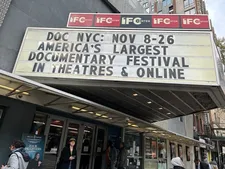 |
| World Premiere of How To Come Alive With Norman Mailer during DOC NYC is at the IFC Center tonight Photo: Anne-Katrin Titze |
JZ: What we did in those cases is we went back to the original 35 mm and so we have these restored prints. Seeing it on the big screen is definitely a valuable experience. And some of that original stuff from the family is very intimate, too. Portraits of Mailer just being a father, being a lover, being a husband, you know, things that are more humanizing than Mailer, the performer, or the boxer, pugilist.
AKT: Also seeing him as a brother. His sister, Barbara, talks about how he expected to be loved and that their mother didn’t teach them, or specifically him, to deal with people who don’t love him.
JZ: Yeah, Barbara is phenomenal. I think Barbara might have been the first or the second interview we did. And I remember thinking at the end of the interview, how incredible would it be if the whole thing is Barbara and Norman? That was all you needed! Then of course every subsequent interview added so much. She was phenomenal - the depth of the psychological analysis stated so simply. That the mother adored Norman so much but she never taught him how to deal with not being loved. I love that.
AKT: Great film, I loved it.
JZ: Oh thank you! I appreciate it! I look forward to the other films in the festival and I look forward to your article! Thank you very much, talk soon!
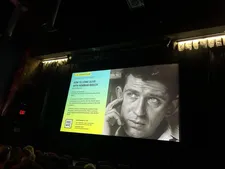 |
| How To Come Alive With Norman Mailer at IFC Center Photo: Anne-Katrin Titze |
Coming up - Jeff Zimbalist on the Betty Friedan, Germaine Greer, Susan Sontag, and Gloria Steinem’s interactions with Norman Mailer; the Dick Cavett show confrontation with Gore Vidal; the heyday of the public intellectual, and more.
DOC NYC World Premiere screening of How To Come Alive with Norman Mailer was on Friday, November 10 at 6:30pm - IFC Center. A Q&A followed with Jeff Zimbalist, producer Vicki Marquette, producer Rudy Langlais, and executive producer John Buffalo Mailer. How To Come Alive with Norman Mailer will be available online from today, November 11 through Sunday, November 26.
DOC NYC in-cinema screenings run through Thursday, November 16.








